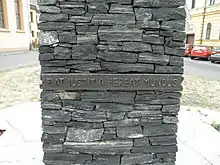Fiat iustitia, et pereat mundus
Fiat iustitia, et pereat mundus is a Latin phrase, meaning "Let justice be done, though the world perish".[1]

This sentence was the motto of Ferdinand I, Holy Roman Emperor (1556-1564),[2]used it as his slogan and it became an important rule to control the nation.[3] Probably originating from Johannes Jacobus Manlius's book Loci Communes (1563).[4] A maxim meaning that a just decision should be made at whatever cost in terms of practical consequences. An alternative phrase is Fiat iustitia ruat caelum with means “Let justice be done, though the heavens may fall.”[5]
A famous use is by Immanuel Kant, in his 1795 Perpetual Peace: A Philosophical Sketch (German: Zum ewigen Frieden. Ein philosophischer Entwurf), to summarize the counter-utilitarian nature of his moral philosophy, in the form Fiat justitia, pereat mundus, which he paraphrases as "Let justice reign even if all the rascals in the world should perish from it."[6][7][8]
This phrase (in the form Fiat justitia piriat mundus) is inscribed on the side of John Constantine's lighter in the 2005 film Constantine[9] (based on the Vertigo comic book series Hellblazer and starring Keanu Reeves).
Ludwig von Mises (from "Human Action", Ludwig von Mises, 1949, p. 190 - 192) reversed it in "Fiat iustitia, ne pereat mundus" (=Let Justice be done, so that the world won't perish), declaring it as the motto of the "utilitaristic economists".
See also
- Fiat justitia ruat caelum, a similar phrase[10]
References
- https://www.oxfordreference.com/view/10.1093/acref/9780195369380.001.0001/acref-9780195369380-e-775
- "imperium-romanum.com - Relikte - Sentenzen". Retrieved 19 September 2014.
- http://law.snu.ac.kr/page_en/about.php
- https://reader.digitale-sammlungen.de/de/fs1/object/display/bsb11196400_00005.html
- https://www.oxfordreference.com/view/10.1093/acref/9780195369380.001.0001/acref-9780195369380-e-775
- "Perpetual Peace: A Philosophical Sketch: Appendix 1". Retrieved 19 September 2014.
- Project for a Perpetual Peace, p. 61. Retrieved 19 September 2014.
- Immanuel Kant's Werke, revidirte Gesammtausg, p. 456. Retrieved 19 September 2014.
- https://sam.propstoreauction.com/view-auctions/catalog/id/138/lot/28317/?url=%2Fview-auctions%2Fcatalog%2Fid%2F138%2F%3Fpage%3D6
- http://law.snu.ac.kr/page_en/about.php